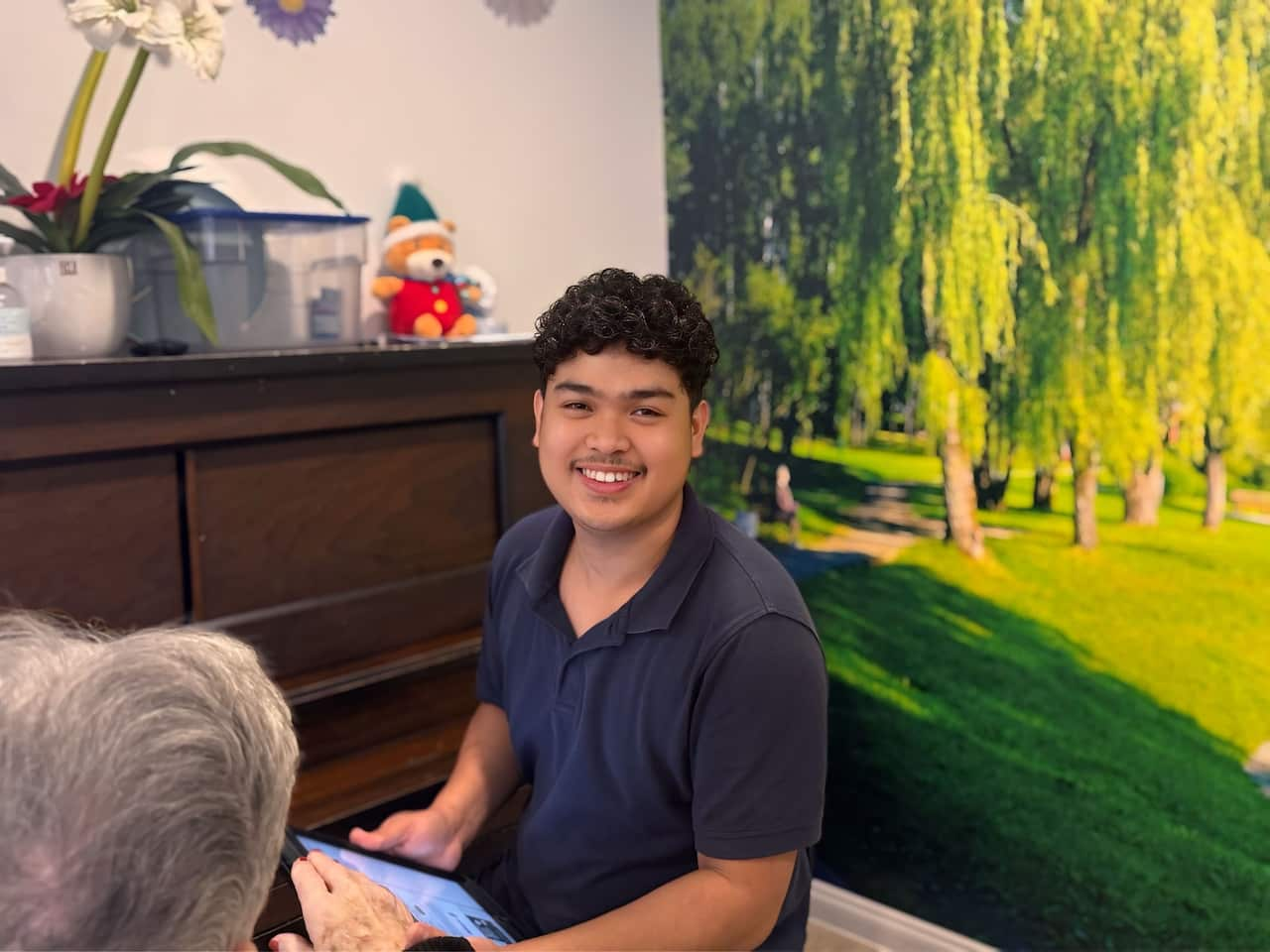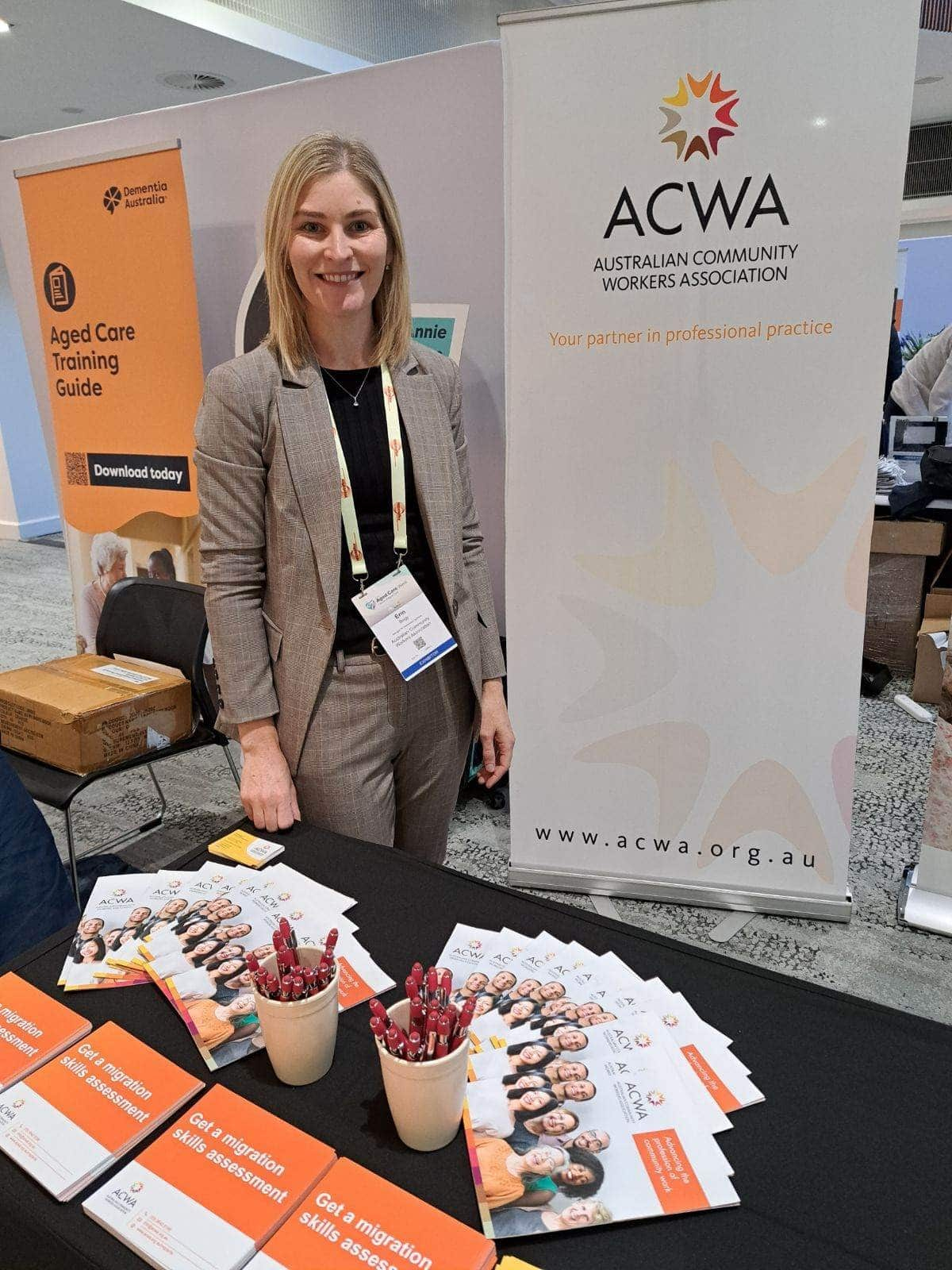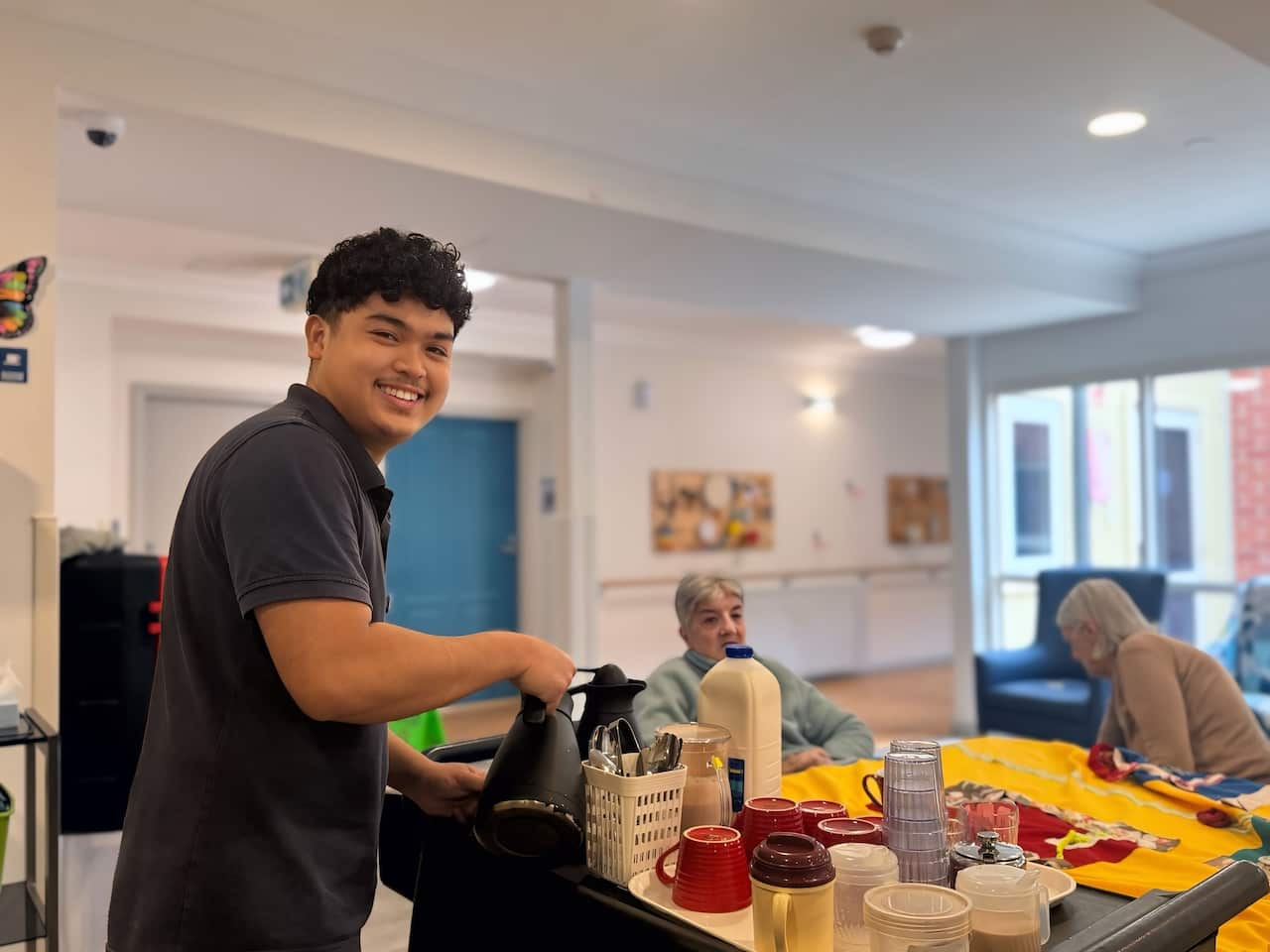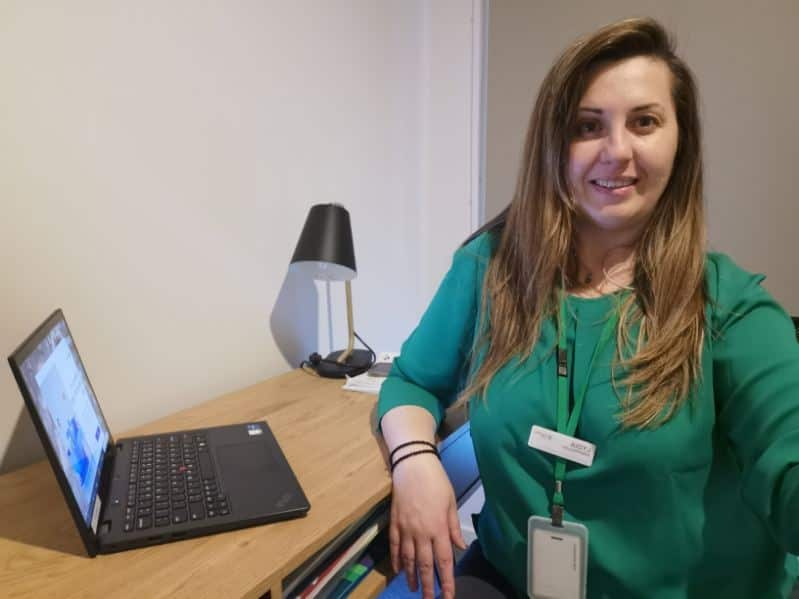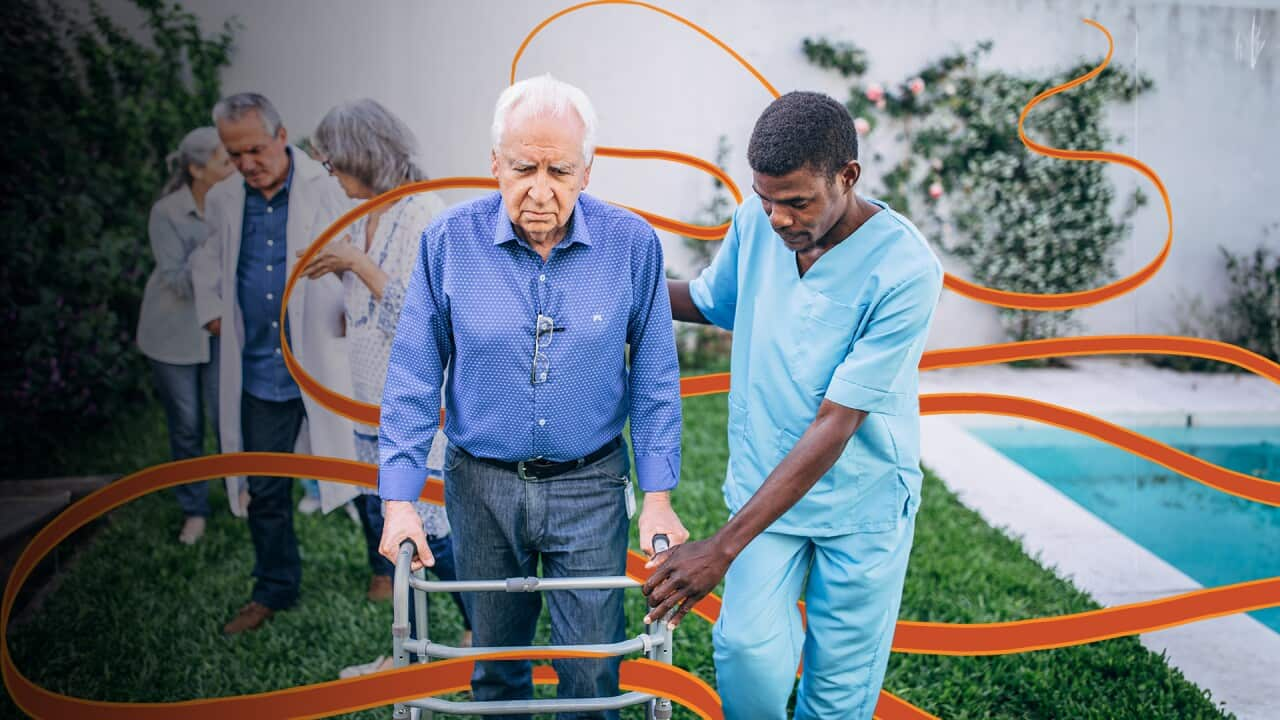spk_0
SBS acknowledges the Traditional Custodians of Country and their connections and continuous care for the skies, lands and waterways across Australia.
spk_1
Due to my visa restriction, a lot of companies have rejected me. I got a few interviews and then when they learned that I am a student, they will say to me straight away that, oh, I'm sorry, actually we need people who can work full time, no matter what word of encouragement, they still reject me because of that and that's very sad.
spk_2
Welcome to Work in Progress, a podcast that follows the stories of adventurous professionals who decided to call Australia home, with helpful tips, advice from experts, and Australian leading organisations on how to build your career here. I'm your host, Francesca Valdinoci, and today we talk about aged care. Let's get to work.
spk_2
Australia is facing a major aged care workforce crisis, with nearly 1 in 5 Australians expected to be over the age of 65 by 2030. The demand for aged care services is outpacing supply.
spk_3
It is definitely a sector that is in dire need of workers. I think the nation faces a shortage of over 100,000 aged care workers by 2030, so there's certainly an immediate need for direct care workers.
spk_2
This is Erin Beigy, manager of assessment services at Community Work Australia, a professional association for aged and disabled carers. With workforce shortages of that scale, cultural and linguistic diversity isn't just helpful, it is an essential asset. That's because Australia's aging population is incredibly diverse.
spk_2
One in 3 aged care recipients were born overseas, so workers who speak languages other than English are increasingly sought after by employers aiming to meet the complex need of a multicultural client base.
spk_3
In the aged care sector in Australia, people from CALD backgrounds make up a large number of people in care. On top of this, with the aging factor,
spk_3
it's not uncommon for people living with dementia to revert back to their mother tongue or their first spoken tongue, even if they were fluent in English previously. So it's certainly advantageous for carers from CALD communities to be looking at those jobs in the sector.
spk_2
But how exactly are overseas workers helping to bridge the gap, and what does it take to begin a career in aged care in Australia?
spk_2
Alvin Encarnacion arrived in Australia in 2023. He was not remotely planning to start a career in aged care, but today he says he has found his calling.
spk_1
It's very fulfilling to work with the elders, getting to know the experience. Most of my elders, I feel like they're
spk_1
Just my grandmother back home, and I feel like by doing that it's just helping my grandmother back home. It's really fulfilling to work in the aged care industry. I felt the sense of belongingness in there, even though I don't have family here. I view my coworkers and those elders as my family. I don't call it a job. It's a calling.
spk_2
Originally from Gattaran, a small town surrounded by the majestic mountains of the northern Philippines, Alvin says Australia is a common dream destination for many young Filipinos.
spk_1
After graduating, they want to go out of the Philippines and start their career in a different country because it's more opportunities there.
spk_1
It's easier to achieve your dream if you started in a different country. It's really sad, to be honest, but that's the reality that I grew up in. A lot of corruption in my country and that's I think one of the biggest reasons why a lot of people want to go out and try their life in other countries.
spk_2
Alvin comes from a humble family who runs a food processing business. He studied food science to help grow the business. He was teaching the subject at a professional college for a year prior to moving to Australia. He arrived here on a student visa, which meant he could only work up to 48 hours fortnightly while studying.
spk_1
Due to my visa restrictions, a lot of companies have rejected me. I got a few interviews and then when they learned that I am a student, they will say to me straight away that, oh, I'm sorry, actually we we need people who can work full time. No matter what word of encouragement, they still reject me because of that and that's very sad.
spk_2
For a year he sent countless CVs in an attempt to secure a job without luck. In the meantime, he studied for an advanced diploma of management, hoping it would help him gain entry into the food industry. The start of his journey was tough. He left the Philippines with nothing, and it was
spk_2
only thanks to the support of the people in his village that his family could afford the airfares. However, he says he was amazed at the support he experienced in Australia. He found particularly helpful community pantries, centers that distribute food and other necessities for free.
spk_1
I've attended to some of those pantries to get some food, free food, get some free clothes.
spk_1
In my country, it's really hard to get that. A lot of people are starving to death, but the government can't even give them anything. But here in Australia you can access those. That's what really amazed me here. Even my family, I video call with them. When I go to those countries, they're very happy because they know that some how
spk_1
I get groceries, you know, even I don't have a job, I have food.
spk_2
But Alvin desperately needed a job. He tried gardening, cleaning, and working as a waiter in a restaurant until a lucky encounter changed the course of his life.
spk_2
A lady he was talking to mentioned randomly that the Sunshine Hospital in Melbourne was looking for support personnel. Since childhood, Alvin's dream was to work in the health industry to become a doctor. Living in Australia reminded him of this, many years after putting his aspirations aside to help his family business.
spk_1
I've worked in different wards. They put me everywhere. I even worked
spk_1
in the management downstairs where if there's like a call bell for emergency calls, we are the ones who go there to stand by if these people need assistance to go to emergency and then I have to pick up cadavers, put them in the mortuary. They let me experience everything and I think that's one of the best experiences that I have in my life.
spk_2
Alvin decided his first steps into healthcare would be through aged care.
spk_2
Thanks to his previous studies, he could start from a certificate 4 in aging support. Caring for elderly people, he says, just comes naturally to him. For those starting out, a certificate 3 in individual support is the typical entry point.
spk_2
It prepares people for roles like aged care, support worker, personal care assistant, and similar frontline positions. But as Erin explains, there's currently no national standard or formal prerequisite to begin working in the sector, which means many people can start with on the job training and build their qualifications over time.
spk_3
Some employers are a little bit more flexible with their requirements, so they may note the qualification requirement as desirable but not essential, or they might note that somebody could be working towards completion of the qualification. It needn't have been completed already, or in some instances they may waive the qualification requirement entirely and they may ask to see previous work experience in the sector.
spk_2
Given the challenges some employers face in retaining staff, they might even offer to cover course fees as an incentive to attract and support new workers.
spk_2
In some states and territories, free TAFE courses are also available for asylum seekers and refugees who hold certain visa types. Some temporary visa holders might be eligible for free waivers or discounted training costs, making aged care a more accessible career path for people from diverse backgrounds.
spk_2
Lydia Kiropoulou is a team leader for an aged care and community service provider. Originally from Kozani, a regional area in the north of Greece, she was a theatre nurse back home before deciding to pursue a career in
spk_2
aged care on moving to Australia in 2015. Since the industry attracts many migrants who are new to the care sector, she stresses on the importance to committing to training.
spk_4
Get your training seriously.
spk_4
No amount of training can teach you how to care, but the training is there to show you the correct way of doing things. So you don't harm yourself, so you don't harm your, your client. So take everything seriously, not just scroll through it. You're doing the job for whatever the reason. Since you are there and you're doing the job, take it seriously. You're dealing with people's lives.
spk_2
Lydia joined her current place of work where she has been employed for almost a decade,
spk_2
after offering to volunteer there.
spk_4
It will give you an understanding of what the employer wants and if at the end of the day that's for you, maybe whilst you're volunteering, you might decide that it's not for me, I might change my pathway. So it will be a good first step to get into and have a sneak peek of how things work and what's expected for you. And if you do like the sector, then you can put that extra effort to show to your employer or to build your network and get employment.
spk_2
Alvin secured his first job as a personal carer while studying.
spk_1
When I applied there, I'm still studying at the time, but since I have the experience in the hospital already, they gave me the chance. I just have to show them that I am eager and I am willing to learn. You know, if thinking right now, even the most impossible thing, it can really happen if you really believe in yourself and believe in what God's plans for you.
spk_2
Alvin is now studying for a diploma in community services. He says that in his 7 months working in the industry, he's never felt tired going home because he genuinely enjoys the work, even though it can be demanding at times. He speaks Ilocano and Tagalog, both languages spoken in the Philippines, as well as English.
spk_2
His language skills and cultural background are highly regarded by prospective employers. Lydia says.
spk_4
The language and the culture that you bring from your own country, it's a big plus. You're caring for people, now they're going towards the end of their life and they divert back to their culture, their customs, their language, even if they know the English. So the worker that gets paired with a client in the aged care sector and they can understand their culture and the language, that worker is a gem for the employer.
spk_2
Like Alvin, Lydia also began in the sector after obtaining an entry-level certification. She started working in home care assistance, and today she manages government fundings to provide home services. As Erin explains, there are many opportunities to grow your career in the sector.
spk_3
You might be starting as an aged care worker following completion of a relevant qualification. Starting out in the sector, there could be opportunities for you to grow in your career. It might mean undertaking some further studies. This is going to open up doors to a much broader range of jobs
spk_3
within the sector that may be of more interest to you. As an example, if you do complete a diploma of Community Services, you would be going from looking at aged care worker roles to team leader, home care coordinator, residential care officer, or even aged care manager, so there is a world of possibility there.
spk_2
A skill assessment is needed for specific immigration purposes. Community Work Australia is an approved skill assessment authority for aged and disabled carers, as Erin explains.
spk_3
The process of assessing somebody's skills is looking at qualifications that have been obtained primarily overseas. If your qualification was obtained overseas,
spk_3
whether it's an Australian qualification or an overseas qualification, you will need to have your skills assessed. And the same goes for work experience. So if you don't have a relevant qualification, your work experience can be assessed in lieu of a formal qualification. So that's just a matter of demonstrating that you have worked for a provider, that you have experience providing care and support, and you can back that up with evidence.
spk_2
The application for a skills assessment through Community Work Australia takes 4 to 6 weeks. It can be a good tool to help prospective employers.
spk_2
To address the shortage of workers in the sector, the Aged Care Industry Labour Agreement was launched in 2023. It was designed to streamline the recruitment of care workers from overseas, but it can also apply to aged care workers who are already in Australia. Erin explains how it works.
spk_3
Australian employers can apply to access the agreement, and they can sponsor overseas workers in key care occupations such as nursing support worker, personal care assistant, and aged or disabled carer. So employers are required to enter into a memorandum of understanding first with the relevant union, and then they can
spk_3
apply for the labour agreement. And then what happens is once that employer is signed up, they can then nominate overseas workers to work for their organisation in one of the three direct care occupations.
spk_2
On the Department of Home Affairs website, there's a list of aged care providers who are signed up to the agreement, and this can also indicate which employer is more open to employ migrant workers.
spk_2
Before Lydia left Greece, she started approaching service providers to get a better picture of what to do when she arrived. She believes in always asking for help.
spk_4
I reached out to them whilst I was in Greece and they told me we need A,B,C,D, you need to do that, you need to have working entitlements within Australia before we can take you on,
spk_4
and so on and so forth. So they guided me even with what kind of qualifications and where can I, how can I get this qualification as an international student. So if you need help, always ask. That's my first tip.
spk_2
Having worked in various roles in the sector for many years, Lydia believes that the most important qualities for an aged
spk_2
care worker are empathy and ethics.
spk_4
Please have heart when you get into the care sector. One day I will be in that position. You will be in that position on the receiving end. And if you have someone that doesn't care for you, it's going to be bad. Get into the sector with the knowledge that you need to do the hard thing, but you're there to offer and you get the reward back.
spk_2
Alvin embodies these principles.
spk_1
Working in the aged care, it's not just a job. It taught me patience, empathy, and a deep respect of life. They have to try it, to cease to believe. There's a lot of things that beyond of what other people know about working in the aged care. I've heard people saying that the job is really not pleasant. There are like incontinent elders.
spk_1
In life, that's normal. We all be in that situation later on. You just have to be more patient with them. Think that as your grandparents, you are helping and in that way that can really help you make the job easier and more enjoyable. Don't think about the stereotypes of jobs. If you really want to do it, just do it.
spk_2
This is an SBS Audio podcast. In work in progress, we dive into careers across nursing, early childhood education, engineering, ICT, construction, and aged care, unpacking the journeys, challenges and rewards along the way.
spk_2
Work in Progress is created and hosted by me, Francesca Valdinoci. Sound design is by Maram Ismail, and the managing editor is Roza Germian.
spk_2
For more helpful tips on settling into your new life in Australia, don't forget to visit Australiaexplained. Thanks for listening and stay tuned for more.
